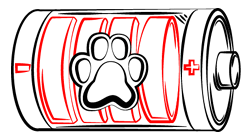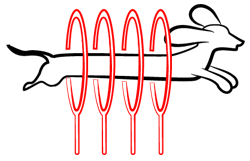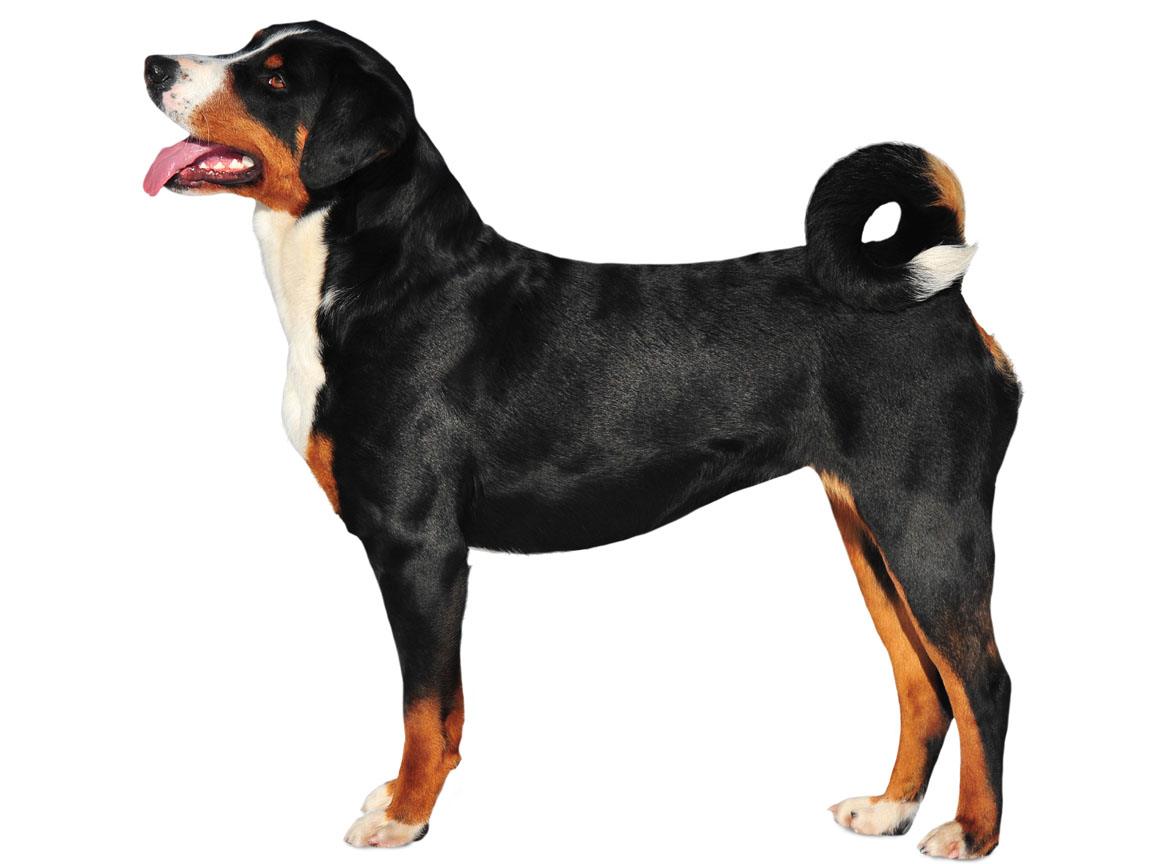
Paws ‘N’ Pups Quickview
Size
| Energy Level
| Trainability
| Paws ‘N’ Pups Rank
|
Characteristics
| Physical Characteristics: Height: 18-23” Weight: 49-70 lbs. Energy Level: High | Colors: The American Kennel Club recognizes the Appenzeller Sennenhunde in the following color:
|
Health & Longevity
Average Life Span: 12-13 years
The Appenzeller Sennenhund is a purebred and is considered to be extremely healthy. There are no known major medical conditions or inherited diseases in this breed. To keep this breed so healthy, it is important that you only work with a reputable breeder and never breed a pup that does have a health condition. While there are no major medical conditions, it is important to know about potential conditions that can arise and what to look out for. Some secondary conditions you should pay attention to include eye problems, hip dysplasia, bloat, and skin conditions.
Eye problems may develop in your Appenzeller Sennenhund so you should keep a watch on his or her health. Common eye problems are not necessarily seen in this breed, but they are in other breeds like it, so it is important to be knowledgeable about them. The ones you need to look out for include eye infections, cataracts, and progressive retinal atrophy, which will lead to complete blindness.
Hip dysplasia occurs in many different breeds and breeds similar to the Appenzeller Sennenhund. You need to watch out for this condition which occurs when the hip joint does not fit within the socket or when the hip joint itself did not form correctly. This is a painful condition and can cause problems when your older pup walks and stands.
Bloat affects many breeds and some are more likely to suffer from it than others. This condition usually affects males more so than females, but can occur in any sex. Bloat happens when a pup swallows too much air. This air becomes trapped in the pup’s stomach and then causes the stomach to expand and place pressure on the surrounding organs.
Lastly, skin conditions can affect your Appenzeller Sennenhund. These skin conditions can range from demodex to dermatitis to skin allergies. While the Appenzeller Sennenhund does not have any known conditions, similar breeds suffer from the above mentioned, so pay close attention to your pup’s skin.
The life expectancy of the Appenzeller Sennenhund is 12 to 13 years.
Temperament & Train-ability
The Appenzeller Sennenhund can be best described as a free spirited, independent, active, intelligent, and loving breed. You will find that this breed likes to be free spirited and independent. This is not a bad thing, but it means that you need to keep an eye on your Appenzeller Sennenhund as he or she may try to roam right out of your yard.
This pup is not a watch dog, but is quite wary of strangers and will alert you to them when they feel that there is a potential threat.
The Appenzeller Sennenhund is not a dominant breed and understands his or her place in the pack, which means he or she will get along with children in the home. You have to understand that this breed is used to herding other animals, so it may not do well with other animals in the home. It can often get along with larger dogs, but smaller animals should not be around this breed.
The Appenzeller Sennenhund is considered intelligent and smart and since it does like to be part of a pack, it will train easily and listen to the commands you give. You want to make sure that you are consistent and firm when it comes to commands, otherwise, you may have a pup who does not listen to you.
This breed needs to be socialized from an early age and you should socialize him with people along with other pets. You also want to make sure that all strangers are properly introduced in your home as well.
Grooming
The Appenzeller Sennenhund does not have extensive grooming needs, but they do shed quite a bit, especially when it is time for them to shed their double coat. You will find that you need to brush your pup’s coat once per day to keep the loose hairs away.
This breed does not need to receive a bath unless he or she becomes very dirty or starts to stink. You should however clean his or her ears once per week to safeguard against an ear infection.
Your Appenzeller Sennenhund’s nails will grow quickly, so be prepared to trim them once a month or as needed. You should make sure that you do not let your pup’s nails grow too long, as this is painful for them, especially when they snag on carpet.
Diet
Your Appenzeller Sennenhund will consume anywhere between two and a half cups of food to three cups of food per day. You want to make sure you choose a high quality brand of food that can meet his or her nutritional needs.
When you look for a brand of dog food, look for one that does not contain any fillers or chemicals. You also need to make sure that the food is high in protein and low in calories.
Looking for an Appenzeller Sennenhunde?
 Find An Appenzeller Sennenhunde Breeder |  Appenzeller Sennenhunde Puppies For Sale |  Adopt An Appenzeller Sennenhunde |
Cost
An Appenzeller Sennenhund puppy will cost anywhere between $500 and $2,500 depending on the breeder you select, the sex of the puppy, and of course, the demand for the breed at the time. You will be hard-pressed to find this breed in a shelter.
In addition to the cost of the puppy, you should factor in the cost for veterinary care, vaccines, and any supplies your pup may need.
Paws ‘N’ Pups Ranking
Paws ‘N’ Pups ranks every breed out of 4 with 1 being easiest to integrate into your life and 4 being the toughest – The lower the ranking the better.
Ranking takes into account a few basic factors including cost, skill level needed, high vs low maintenance and how critical regular training is to success. The Appenzeller Sennenhund is a good family dog that will look to you for leadership while being submissive to your children and other family members. This pup likes to be part of a pack and should be treated as a member. This breed is easy to train, but does not always do well with small animals in the home and should never be left alone with them. This breed ranks a 2.
Breeds Similar To Appenzeller Sennenhunde
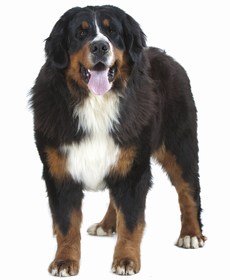 Greater Swiss Mountain Dog | 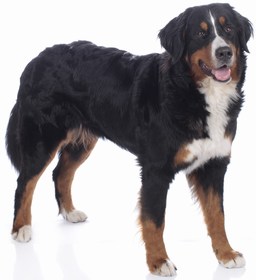 Bernese Mountain Dog | 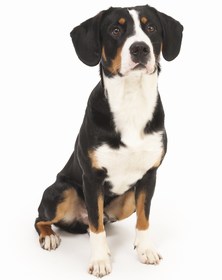 Entlebucher Mountain Dog | 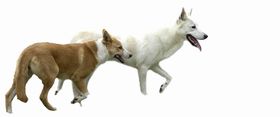 Canaan |


